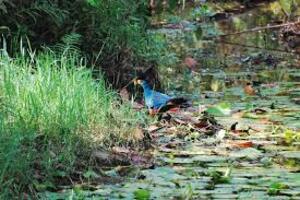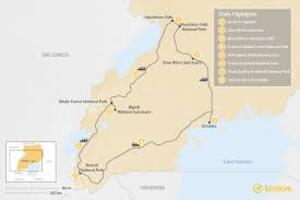 Photo of: magical Bigondi Wetlands Sanctuart
Photo of: magical Bigondi Wetlands Sanctuart
 Photo of: an atlas map of bigondi wetlands
Photo of: an atlas map of bigondi wetlands
Discover the beauty of Uganda's Bigodi Wetlands through our exciting tours and safari packages. Immerse yourself in the lush greenery and vibrant wildlife while learning about the conservation efforts
Explore the incredible Bigodi Wetlands with our expertly crafted tours and safari packages! Get up close and personal with the diverse wildlife and stunning scenery of this pristine nature reserve. Immerse yourself in the local culture and learn from our knowledgeable guides about the importance of conservation efforts in this unique ecosystem. Book your Bigodi Wetlands adventure today!
Exploring Bigodi Wetlands' Natural Beauty
Bigodi Wetlands are tucked away amid Uganda's beautiful surroundings, offering a tranquil beauty and a wealth of species. Along with monkeys, otters, and vibrant butterflies, visitors to this wetland sanctuary can expect to see a wide range of bird species, including the rare shoebill stork. The dry season, which runs from June to September, is the ideal time to visit Bigodi Wetlands since it provides the best conditions for nature walks and wildlife observation.
Travelers can fly into Entebbe International Airport and then take a scenic drive or domestic flight to surrounding towns like Fort Portal or Kasese to reach Bigodi Wetlands. From there, you may easily and thoroughly enjoy your trip to Bigodi Wetlands using local transportation options including buses, taxis, or guided excursions.
Bigodi Wetlands Exploration Safari Adventures
Safari packages for Bigodi Wetlands typically range from depending on the duration, accommodation, and included activities.During your safari in Bigodi Wetlands, expect to encounter a diverse array of wildlife such as chimpanzees, monkeys, various bird species including the rare shoebill stork, and reptiles like snakes and lizards. The wetlands are also home to lush vegetation, swamps, and picturesque landscapes that provide a rich habitat for these species.Apart from wildlife viewing, visitors can explore nearby attractions like Kibale National Park, known for its chimpanzee tracking experiences, and Fort Portal town, offering cultural insights and historical landmarks.
Wetlands experience a tropical climate with two main seasons: a wet season from March to May and October to November, and a dry season from December to February and June to August. The dry season is ideal for safaris due to better visibility and accessibility to wildlife areas.Essential items to bring on a safari in Bigodi Wetlands include lightweight clothing suitable for warm weather, sturdy hiking boots, a hat for sun protection, insect repellent, binoculars for wildlife spotting, a camera with extra batteries, and a reusable water bottle for hydration during excursions. Additionally, it's advisable to pack rain gear and long-sleeved clothing for evenings when temperatures may drop. These items ensure a comfortable and enjoyable safari experience amidst the natural beauty of Bigodi Wetlands
Essential Information for Exploring Bigodi Wetlands
Travelers visiting Bigodi Wetlands in Uganda typically need a valid passport and may require a tourist visa. Check with the Ugandan embassy or consulate in your country for specific requirements and obtain necessary visas before your trip. Entebbe International Airport is the main gateway to Uganda. From there, travelers can take domestic flights or drive to nearby towns like Fort Portal, followed by local transportation options such as taxis, buses, or organized tours to reach Bigodi Wetlands.The main attractions in Bigodi Wetlands include birdwatching tours to spot rare species like the shoebill stork, guided nature walks through the wetlands to observe wildlife such as chimpanzees and monkeys, and cultural experiences with local communities.To save money on your Bigodi Wetlands trip, consider booking accommodations and tours in advance for discounts, opting for budget-friendly lodgings or guesthouses, using public transport or shared taxis, and enjoying local street food for affordable dining experienc
Look for flight deals and promotions, book flights well in advance, be flexible with travel dates, consider indirect routes or layovers, and use fare comparison websites to find the best prices for flights to Entebbe International Airport.Essential items to pack for a trip to Bigodi Wetlands include lightweight and breathable clothing suitable for warm weather, sturdy hiking boots or walking shoes, sun protection (hat, sunglasses, sunscreen), insect repellent, binoculars for wildlife viewing, a camera with extra batteries, and a reusable water bottle for hydration during outdoor activities.Wear comfortable and lightweight clothing such as t-shirts, shorts, and pants for outdoor activities. It's also advisable to pack a light jacket or sweater for cooler evenings, especially during the dry season. Opt for earth-toned colors to blend in with the natural surroundings and closed-toe shoes for walking in the wetlands.
Important Information for Bigodi Wetlands Visitors
When traveling with children to Bigodi Wetlands, ensure they have appropriate clothing and footwear for outdoor activities. Keep them hydrated and protected from the sun with hats and sunscreen. Be mindful of their safety near wildlife and water bodies, and engage them in age-appropriate activities to enhance their experience.Consider purchasing comprehensive travel insurance that covers medical emergencies, trip cancellations, and personal belongings. Verify the coverage details, including activities such as safaris and outdoor excursions, to ensure a smooth and worry-free trip.Explore top destinations like Bigodi Wetland Sanctuary for birdwatching, Kibale National Park for chimpanzee trekking, and nearby attractions like Fort Portal town and Amabere Caves for cultural and historical experiences.
Enjoy entertainment options in Bigodi Wetlands such as local cultural performances, music events, and traditional dance shows organized by community groups or lodges. Stay safe in Bigodi Wetlands by following guidelines from local guides and authorities, avoiding solo walks in isolated areas, securing your belongings, and being aware of wildlife and natural hazards.Solo travelers should inform someone about their itinerary, carry essential items like a map, flashlight, and emergency contacts, join group tours for safety, and interact with locals to enhance their experience.Discover adults-only accommodations like Bigodi Wetlands Lodge and Chimp Nest Lodge, offering tranquility and privacy amidst nature.Some lodges and guesthouses in Bigodi Wetlands, like Kibale Forest Camp, welcome pets, providing a pet-friendly environment for travelers with furry companions.
Exploring Bigodi Wetlands: A Comprehensive Guide
While public transport is limited, visitors can use taxis, private transfers, or rental cars for local travel within Bigodi Wetlands and nearby areas.Budget-conscious travelers can consider accommodations like Bigodi Wetlands Guesthouse, Green Haven Guesthouse, and Kibale Forest Camp for comfortable yet affordable stays. Explore natural wonders at Kibale National Park, known for chimpanzee trekking, and nearby reserves like Sebitoli Forest, offering diverse wildlife and scenic landscapes.Indulge in luxury at lodges like Kyaninga Lodge and Ndali Lodge, offering exclusive amenities and breathtaking views of the surrounding area.
Discover local history and culture at Fort Portal Museum, featuring exhibits on the region's heritage, artifacts, and traditional crafts.Winter months offer ideal conditions for outdoor activities in Bigodi Wetlands, including birdwatching, nature walks, and cultural experiences with local communities.Enjoy hiking adventures in nearby areas such as Kibale National Park, Rwenzori Mountains, and Crater Lakes region, showcasing diverse flora and fauna. Evening entertainment options include cultural performances, bonfires, stargazing, and guided night walks to observe nocturnal wildlife in their natural habitat.
| Related FAQs |
|---|
